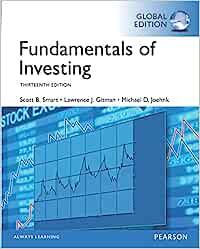Ibrahim bought 200 shares of a stock trading in the Abu Dhabi Securities Exchange at AED 12
Question:
Ibrahim bought 200 shares of a stock trading in the Abu Dhabi Securities Exchange at AED 12 (United Arab Emirates dirham) per share. Over time, the price of the stock increased to AED 18 per share. Since the political risk in the Middle East is increasing, there have been days where the market was very volatile. Ibrahim still thinks that the value of the stock is undervalued because he has done a lot of fundamental and technical analysis on the stock. When he heard that the Abu Dhabi Securities Exchange is offering options on the stocks that trade in the exchange, he consults with his broker on the different methods of protecting his profit and, at the same time, not lose the appreciation potential of the stock.
After the consultation, Ibrahim decides to buy a put on the stock. His broker tells him that he can buy three-month puts, with a strike price of AED 18, at a cost of AED 1.5 per option.
Questions
a. Given the circumstances surrounding Ibrahim’s current investment position, what benefits would be derived from using puts as a hedge device? What would be the major drawback?
b. What will be Ibrahim’s minimum profit if he buys two puts at the indicated price? How much would he make if he did not hedge but instead sold his stock immediately at a price of 18 AED per share?
c. Assuming Ibrahim uses two puts to hedge his position, indicate the amount of profit he will have if the stock moves to AED 25 by the expiration date of the puts. What if the stock drops to AED 11 per share?
d. Should Ibrahim use the puts as a hedge? Explain. Under what conditions should he not use puts as a hedge?
Step by Step Answer:

Fundamentals Of Investing
ISBN: 9781292153988
13th Global Edition
Authors: Scott B. Smart, Lawrence J. Gitman, Michael D. Joehnk





